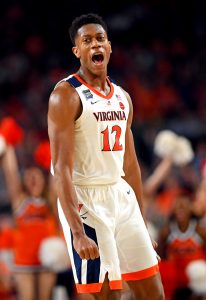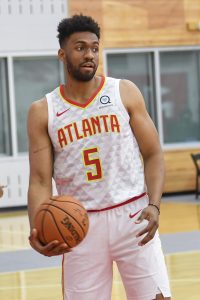Schlenk and the Hawks’ front office essentially continued down that path this summer. The team’s acquisition of Allen Crabbe was a classic salary-dump deal that netted extra first-round picks in both 2019 and 2020 — all Atlanta had to give up was a 2021 second-round pick, a player who apparently wasn’t in the team’s long-term plans (Taurean Prince), and 2019 cap room.
The Hawks were also quiet in free agency once again, waiting out the first wave of blockbuster deals and making only modest investments once the dust settled. It all points to a team that knows its rebuild is an ongoing process.
On the other hand, we saw this offseason that the Hawks are willing to start consolidating their assets for the right deal. The blockbuster trade they made with the Pelicans on draft night saw them absorb an unwanted contract (Solomon Hill‘s) and surrender the Nos. 8, 17, and 35 picks from this year’s draft. The target? De’Andre Hunter, whom Atlanta traded up to No. 4 to snag.
Hunter is just 21 years old and has yet to make his NBA debut, so he isn’t the sort of player who will turn Atlanta into a contender right away. But the deal foreshadowed the pivot that should be around the corner for the Hawks, who may not be in rebuilding mode for much longer. The next time Schlenk decides to consolidate his assets in a major trade, he may be targeting a veteran star who can help make the team a legit contender.
Key offseason losses:
The Hawks’ roster underwent some major turnover this summer, which can be attributed in large part to the eight trades the team completed. Kent Bazemore, Taurean Prince, and Omari Spellman were among the players traded away by Atlanta.
Bazemore, a veteran three-and-D wing, was entering a contract year and was coming off a down season. Prince, who played a similar role for the Hawks, had a strong season in 2018/19 but was also in the final year of his deal — having been drafted by the previous regime in Atlanta, he probably wouldn’t have received a lucrative second contract from the current group. As for Spellman, I was a little surprised to see the Hawks move on from the 2018 first-round pick after a rookie season in which the big man showed some outside shooting touch.
The Hawks’ most notable departing player may have been Dewayne Dedmon, who left via free agency rather than in a trade. The veteran center had been quietly effective during his two seasons in Atlanta, and established new career highs in a handful of categories in 2018/19, including PPG (10.8), 3PT% (.382), BPG (1.1), and SPG (1.1). His presence in the middle will be missed.
Key offseason additions:

Of all the newly-added players on the Hawks’ roster, Hunter is the one most likely to spend the next 10 years in Atlanta. Already this fall, Hawks coaches and Hunter’s new teammates have been heaping praise on the youngster, who won an NCAA championship in his final year at Virginia and was named the ACC Defensive Player of the Year.
With building blocks Trae Young, John Collins, and Kevin Huerter already in place, Hunter should fit nicely into the club’s long-term plan as a versatile combo forward who can knock down three-pointers and lock down opposing scorers.
Of course, Hunter wasn’t the only prospect the Hawks selected in the 2019 lottery — Cam Reddish, the 10th overall pick, also joins the mix. It was an up-and-down freshman year at Duke for Reddish, who is one of the NBA’s youngest and rawest players, but his upside is tantalizing, and the Hawks can afford to take it slow with him.
Atlanta also figures to things slow with rookie center Bruno Fernando, the team’s final draft pick of 2019, who may develop into a reliable backup at the five, but figures to slot in behind Alex Len and Damian Jones on the depth chart out of the gate.
Speaking of Jones, he was one of several veterans on expiring contracts brought in by Atlanta in the team’s various trades this summer. Besides Jones, the Hawks also acquired Chandler Parsons, Evan Turner, and Crabbe. All of them – with the possible exception of Parsons – should play, but it’s hard to picture any becoming long-term fixtures in Atlanta. Jones may have the best chance if he stays healthy and impresses. At age 24, he has been limited to just 49 total NBA games due to injuries.
Finally, the Hawks also signed Jabari Parker to a two-year, $13MM contract which features a second-year player option. It was a somewhat surprising move for a team that seemed to be prioritizing 2020 cap flexibility. It also represented the biggest salary commitment Schlenk has made to a veteran free agent since he arrived in 2017.
After Atlanta struggled on defense last season, head coach Lloyd Pierce has stated that he wants to see “consistency” on that end of the floor in 2019/20, and Parker has never been a particularly strong defender. The former No. 2 overall pick does possess the sort of play-making ability that could alleviate some pressure on Young on offense, but it will be interesting to see how he fits in on Atlanta’s young roster.
Outlook for 2019/20:
The Hawks took a small step forward in 2018/19 by bumping their win total from 24 to 29. I’d expect that number to creep slightly higher this season as Young, Collins, and Huerter improve, but I’d be surprised if Atlanta is ready to make the leap to playoff team quite yet.
Hunter and Reddish were the club’s most notable offseason additions, and while they represent promising long-term pieces, they’re unlikely to have a massive on-court impact as rookies. Meanwhile, none of the incoming veterans project to be more than role players on this year’s squad.
This is a team on the rise and it should be an exciting one to watch, but my guess is that the Hawks are still a year or two away from making serious noise in the East.
Salary information from Basketball Insiders was used in the creation of this post. Photos courtesy of USA Today Sports Images.

